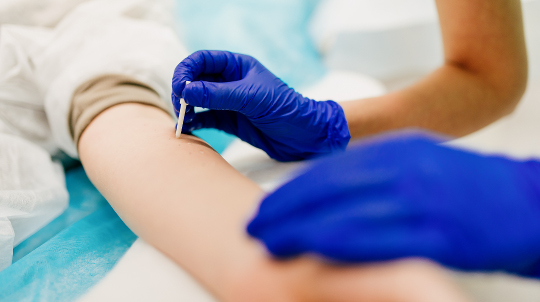If in the case of food allergies or seasonal pollen allergies a person can at least guess what exactly caused the illness, then with contact dermatitis the situation is much more complicated, because every day we touch a large number of objects. In such cases, testing is indispensable.
Allergy tests are of the following types:
- patch test is a skin test to identify the causative agent of contact dermatitis. These are special patches that are applied to the interscapular area of the back. The patient wears such patches for two days, and after another two days the result can be assessed: is there any hyperemia, redness, or papules. For the patch test, as a rule, a European panel is used, containing 30 of the most common haptens (allergens) in Europe, distributed over three patches. In addition, there are special professional panels: hairdressing, baking, dental, etc., which are used in the relevant industries and help identify allergens specific to a particular type of activity;
- The skin prick test is another skin allergy test commonly used to identify triggers of food intolerances and inhalant allergens. The test consists of the doctor dropping a histamine solution (positive control), a dissolving liquid (negative control) and an allergen solution onto the skin, while pricking it with a plastic scalpel (hence the name, in English «prick»), and after 15 minutes assesses the body’s reaction (papule size, presence of erythema);
- ALEX test – comprehensive allergy diagnostics. This test panel contains the 300 most common haptens in the region;
- The standard for diagnosing allergies is confirmation by blood tests and skin tests.
All of the above tests and a blood test for allergies, that is, immunoglobulin E, which indicates the presence of an allergic reaction, can be taken at the VIRTUS clinic in Odessa.
Indications and contraindications for taking allergy tests
There are no contraindications for taking allergy tests. Even if you have a complicated allergic history, that is, if a person has already had cases of anaphylaxis or angioedema, you can safely take a prick test: allergenic agents cannot penetrate deeper than the dermis, much less enter the circulating bloodstream. Patch tests are also safe for everyone.
As for the indications, usually other specialists (family doctor, ophthalmologist, dermatologist, otolaryngologist) refer you to an allergist, but a person should pay attention to the following symptoms:
- the presence of rash, redness, hives on the skin, accompanied by itching and pain;
- nasal congestion, nasal discharge;
- lacrimation;
- headache;
- dizziness.
Allergy tests for children are no different from adults; there are no specific conditions here.












